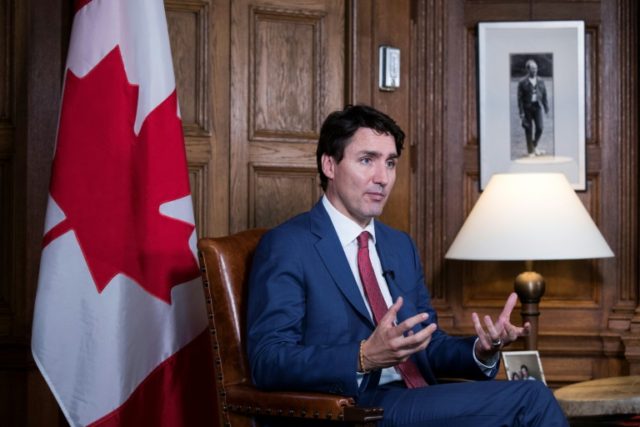Ottawa (AFP) – Canadian Prime Minister Justin Trudeau hopes the G7 will step up to fight extreme nationalism, and adopt concrete measures on the environment and women’s education in crisis zones when it meets in Canada next month, he told AFP in an exclusive interview.
“Many countries and many citizens are questioning the current system, as seen by the emergence of extreme nationalism or right-wing populism, or (voicing opposition) to anti-globalization,” Trudeau said.
“This must be at the center of the discussions we will have at the G7: how to reassure citizens about the future we are building together,” he added in his parliamentary office in Ottawa.
“It is important that we remain vigilant and keep this order, this peace, this stability, this predictability that has helped us to create everything we have today.”
President Donald Trump’s recent decision to pull the US out of the Iranian nuclear deal is expected to be front and center at the June 8-9 summit in La Malbaie of leaders of the world’s seven largest industrialized nations — Britain, Canada, France, Germany, Italy, Japan and the United States.
Global trade is also on the menu, as Canada, Mexico and the United States hold crunch talks to try to secure a new North American Free Trade Agreement, and Europe and Japan push back against US protectionist trade policies.
Still, Trudeau suggested that US President Donald Trump will not feel alone at the table, because the G7 summit will “seek consensus on security and economic issues.”
There will be “real robust discussion on how we can move forward together,” Trudeau promised.
– Gender equality –
Host Canada is planning to focus on gender equality at the summit, unveiling a G7 advisory council on the issue.
“Gender parity, the defense of women’s rights, the inclusion of LGBT and other minorities in society is not just a moral argument, it is an economic imperative,” Trudeau said.
The Canadian leader said he would encourage his G7 peers to tackle this issue in developing countries where “a lot of investment” is required, especially “in places of crisis, in refugee camps (where) education for girls is almost absent.”
“If, as a G7 nation, we can invest in the education of women and girls in crisis, we will reduce the impact of the crisis… and make sure not to lose a generation” and preserve the ability of “these women and girls to contribute to a better world,” he said.
– Ocean pollution –
Canada will also press for action to clean up the world’s oceans, as part of a larger environmental and climate agenda.
“This is one of the topics in which there is the most consensus in the G7 and around the world,” Trudeau said, adding that talks at the summit would broach sustainable fisheries, reduced plastic consumption and waste, and improved ocean data collection and science.
To face climate change and its corollary “extreme weather events,” Trudeau called for urgent preventative and adaptive measures, such as building “resilient infrastructure.”
Trudeau pointed to rising sea levels affecting coastal nations, and an increased frequency of hurricanes and floods.
Oceans protection is a global concern and the G7 must demonstrate “real leadership” in dealing with this difficult issue and “deliver tangible results,” Trudeau said.
“Canada has the world’s longest coastline, and oceans are extremely important to us, but we’re not alone and it’s an area where we can find a lot of common ground,” he added, noting “broad” support from governments and the private sector.
– Marijuana legalization push –
The G7 summit is taking place a few months before Canada is scheduled to legalize the recreational use of marijuana.
Canada’s government statistical agency has estimated the domestic market will be worth Can$5.7 billion ($4.5 billion US) based on last year’s consumption data.
Canadian producers are already positioning themselves to become world leaders in the sector.
Uruguay legalized pot five years ago and several US states have too. Trudeau said other nations are closely watching Canada’s move and may follow suit.
“There is a lot of interest from our allies in what we’re doing,” the prime minister said. “They recognize that Canada is being daring… and that the current regime (of prohibition) does not work.”

COMMENTS
Please let us know if you're having issues with commenting.